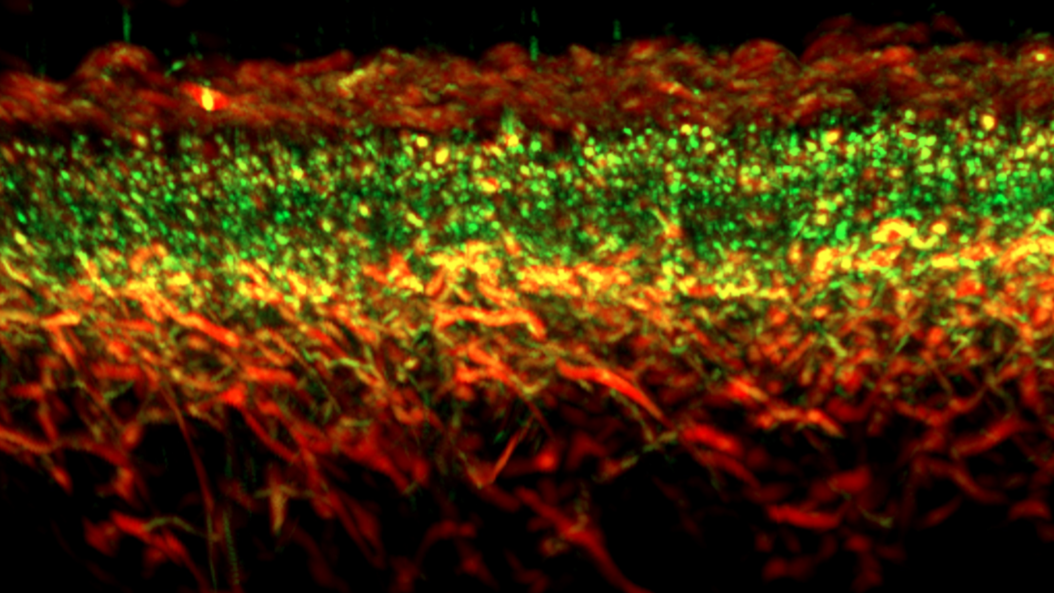A method to shed unprecedented views into skin diseases: that was the goal when the INNODERM project was launched in 2016 under the leadership of the Technical University of Munich (TUM). It has yielded a novel imaging modality that can see deeper and with higher discrimination beneath the skin surface than any competing method today. The project has now been chosen as the winner of the European Commission’s 2021 ECS Innovation Award.
Raster scan optoacoustic mesoscopy – RSOM for short – is the name of the pioneering imaging technology developed as part of the EU-funded INNODERM project. With an RSOM scanner, it becomes possible to capture very detailed vascular and cellular structures under the skin surface and precisely analyse changes of the skin. This is important, for example, in following the progression of diseases like psoriasis, eczema or melanoma. This was not possible with previous approaches like visual inspection, optical imaging or ultrasonography, as they do not provide sufficient contrast or depth penetration to obtain comparable information. The RSOM scanner has been used to image the extent of melanomas with unprecedented detail under the skin surface and quantify treatment efficacy associated with psoriasis, offering more objective and accurate observations that could enable doctors to determine if treatments are taking effect.
An international team headed by Vasilis Ntziachristos, Professor of Biological Imaging at TUM and Director of the Institute for Biological and Medical Imaging at Helmholtz Munich, spent five years refining and developing the technology. The project, which has involved research institutions as well as partners in industry, has generated more than 20 scientific papers. When INNODERM first began, the RSOM required a large laboratory installation to operate. In the meantime, however, the team has squeezed the technology into a portable scanner around the size of a medical ultrasound device. It is now being used for research purposes at several university hospitals around the world. Certification for use in physicians’ practices and hospital clinics is expected by the end of 2022.
Jury praises INNODERM’s technological progress
At the European Forum for Electronic Components and Systems (EFECS), a major congress of the European electronics industry, INNODERM received the ECS Innovation Award. The award is presented annually by the European Commission and the European Health and Digital Executive Agency (HaDEA) in recognition of innovative projects funded under the EU research and innovation program Horizon 2020. The jury praised the technological progress made by INNODERM and was impressed by the project's progress in developing the scanner into a commercial device by INNODERM partner iThera Medical GmbH. INNODERM received 3.8 million euros in funding through Horizon 2020.
Imaging with no radiation or contrast agents
Optoacoustic imaging, which fuels RSOM, is a modality that is intensively studied by Prof. Ntziachristos’ team in more than 15 years. Put simply, light pulses illuminate and are absorbed by tissue and converted to ultrasound waves, which are then detected by sensors and mathematically converted into images. Since each molecule absorbs and responds uniquely to different colors of light, the technique can be used to study anatomical and biochemical features of tissue. This makes RSOM capable of resolving details like microvascular, tissue oxygenation concentrations, endothelial function and other pathophysiological processes. This is all without the need to use contrast agents and ionizing radiation, making the method extremely safe and non-invasive for patients.
A follow-up project to INNODERM began in 2020. Also funded by the EU, the WINTHER project aims to improve RSOM technology while continuing to miniaturize the equipment. Along with skin diseases, the new scanner will be suitable for detecting and monitoring cardiovascular conditions and diabetes. OPTOMICS, an international EU project launched in 2021, also headed by Prof. Ntziachristos, is studying how RSOM data can be combined with multi-omics measurements to lead to a digital twin used for prognosis and treatment planning for type-2 diabetes.
More information
Publications:
-
Aguirre, J., Schwarz, M., Garzorz, N., Omar, M., Buehler, A., Eyerich, K. & Ntziachristos, V. Precision assessment of label-free psoriasis biomarkers with ultra-broadband optoacoustic mesoscopy. Nat Biomed Eng 1, 0068 (2017). DOI: 10.1038/s41551-017-0068
-
Haedicke K, Agemy L, Omar M, Berezhnoi A, Roberts S, Longo-Machado C, Skubal M, Nagar K, Hsu HT, Kim K, Reiner T, Coleman J, Ntziachristos V, Scherz A, & Grimm J. High-resolution optoacoustic imaging of tissue responses to vascular-targeted therapies. Nat Biomed Eng. 2020 Mar;4(3):286-297. DOI:10.1038/s41551-020-0527-8.
-
Hindelang, B., Aguirre, J., Berezhnoi, A., He, H., Eyerich, K., Ntziachristos, V., Biedermann, T., & Darsow, U. Optoacoustic mesoscopy shows potential to increase accuracy of allergy patch testing. Contact Dermatitis. 2020; 83: 206– 214. DOI:10.1111/cod.13563
-
Hindelang, B., Aguirre, J., Berezhnoi, A., Biedermann, T., Darsow, U., Eberlein, B., & Ntziachristos, V., Quantification of skin sensitivity to ultraviolet radiation using ultrawideband optoacoustic mesoscopy. Br J Dermatol (2021), 184: 352-354.DOI:10.1111/bjd.19463
Prof. Ntziachristos heads the Biological Imaging group at TranslaTUM, the Center for Translational Cancer Research at TUM. In this interdisciplinary research institute, doctors work with colleagues from the fields of natural sciences and engineering on research into causes, diagnostics and potential treatments of cancerous diseases. Prof. Ntziachristos is also Principal Investigator at the Munich Institute of Biomedical Engineering (MIBE), an Integrative Research Institute at TUM. He has received numerous awards for his research, including the Gottfried Wilhelm Leibniz-Preis. In 2021, he was awarded the Karl Heinz Beckurts Prize, which honors achievements resulting from cooperation between science and industry.
CONTACTS MEDIA RELATIONS
Corporate Communications Center
Klaus Becker
klaus.becker(at)tum.de
presse(at)tum.de
Teamwebsite
Pressekontakt MIBE
Carolin Lerch
carolin.lerch(at)tum.de
presse(at)bioengineering.tum.de
Contacts to this article:
Prof. Dr. Vasilis Ntziachristos
Technical University of Munich
Chair of Biological Imaging
Tel.: +49 89 4140 7211

